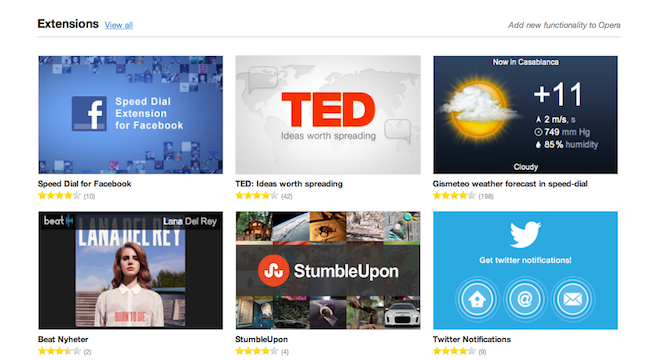Google’s Chrome may be the most popular Web browser in the world according to third-party tracking statistics, but Norwegian company Opera has a powerful ally helping with its newest Opera browser version release: Facebook.
On Tuesday, Opera released the “final version,” of its Opera 12.10 browser. The updated Web browser includes several major improvements over the previous version, including updates to Opera’s “Speed Dial” start screen — the default page that a user sees when they first open the browser or a new tab. Instead of a blank page, Opera’s Speed Dial, first introduced back in 2007, allows users to add their own small thumbnail links to their favorite websites.
But beyond that, Speed Dial allows the opportunity for users to add extensions from other websites — small programs that can automatically update with new content from the websites right on the Speed Dial start page, so a user doesn’t even have to visit a website to see what’s changed.
This is an especially powerful feature in the case of social networks, appointments and email, where a user may want to keep track of new updates constantly, but not necessarily visit the website in a new tab or interact with the content right away. So it makes sense that Opera 12.10 includes new extensions for Gmail, Google Calendar, Twitter and Facebook.
For Facebook, Opera notes on its blog that the Speed Dial extension allows users to see updated Facebook photos without visiting the website.
The Facebook Speed Dial extension for Opera 12.10 is of special interest because Facebook was reportedly considering buying the entire company to make its own social Web browser, as the blog Pocket Lint reported in May 2012.
The supposed contemplation of that deal sparked enormous interest from tech blogs, but has yet to materialize.
Still, an Opera spokesperson confirmed to TPM in a statement that “Opera worked with Facebook for its portion of the Speed Dial extension to ensure quality and usability,” further adding that the company “works closely with Facebook to help deliver the best user experience for Facebook across our products (desktop, mobile and TV).”
Asked whether there was any truth to the earlier report of Facebook mulling an outright purchase of Opera, the latter company’s spokesperson told TPM: “Opera does not comment on rumors and speculations.”
With upwards of 275 million users globally, Opera is the fifth most popular web browser in the world, according to the latest six-week stats from third-party tracking firm statCounter, which found that Opera had just 1.64 percent market share compared to Google Chrome’s 35.58 percent and Internet Explorer’s 31.5 percent:
In mobile, Opera fares much better, coming in third place with 19.55 percent of the market, compared to Apple’s iOS Safari browser’s 19.96 percent and Google Android’s 25.69 percent:
Source: StatCounter Global Stats – Mobile Browser Market Share
Opera actually has two mobile browser offerings: Opera Mobile for smartphones and Opera Mini for feature (“dumb”) phones, which netted a combined 200 million users as of July, Opera said.
Opera in February launched expanded support for social networks on its Opera Mini browser for feature phones, noting at the time that it was catering to those markets where feature phone adoption was still growing a rapid clip, namely the developing world — with India, Africa and Vietnam among the countries where Opera Mini use is most prevalent.
Conveniently enough, that strategy of focusing on users in developing markets is also one that Facebook has pursued lately with its own feature-phone optimized view of the social network, known as “Facebook Zero.”
On the higher-bandwidth end of things, having a browser optimized to work with a particular social network may also be a future course of action for companies. Google’s recent demo of using its Chrome browser to provide an immersive, interactive social networking experience on Google Plus through a user’s smartphone is proof that there is some investment in this model already.
Plus, if Facebook really is trying to become the ultimate cross-platform ecosystem for apps, as founder and CEO Mark Zuckerberg recently alluded to in his company’s October earnings statement, there are worse ways to go about that than partnering with a cross-platform browser like Opera — which works on PC and Mac desktops, and on a variety of mobile devices.






